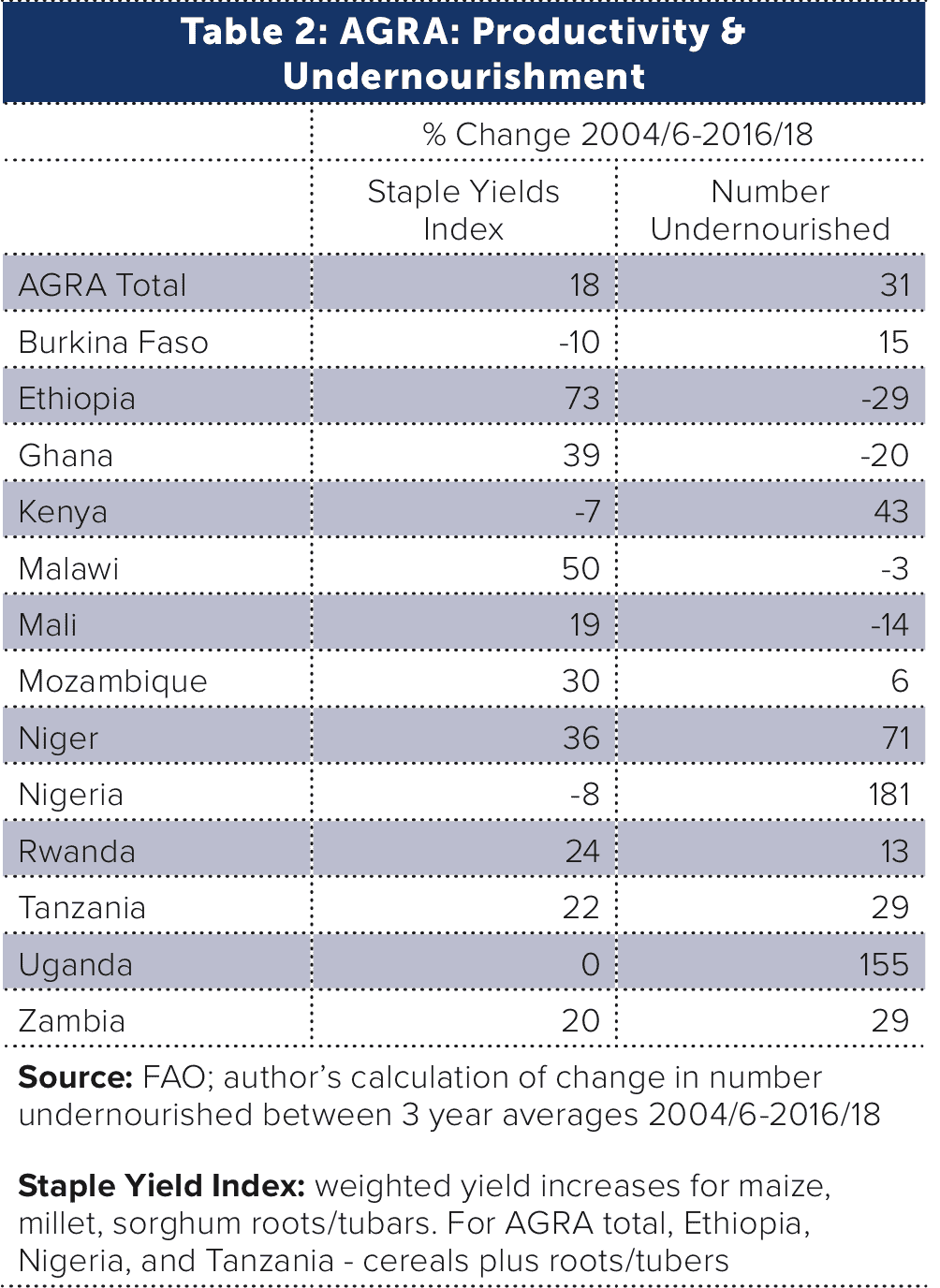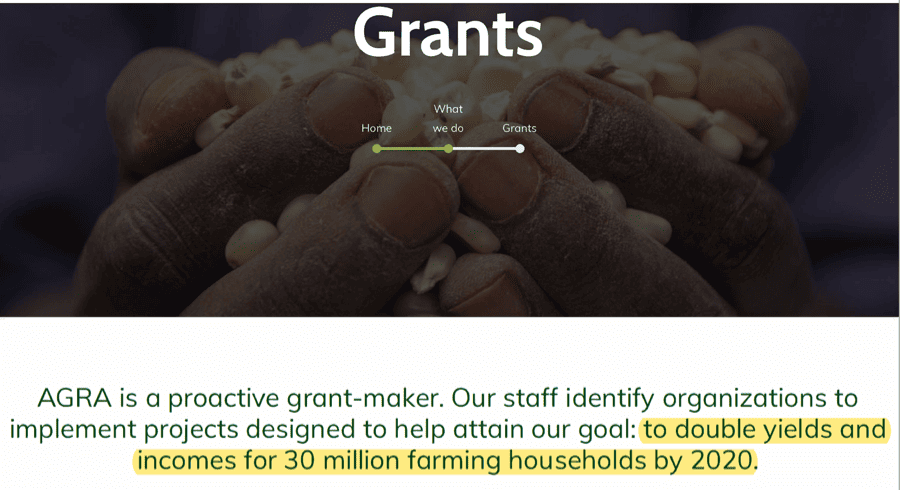Research from Tufts GDAE finds the billion-dollar Alliance for a Green Revolution in Africa is not living up to its promises
A longer version of this article ran in The Ecologist
By Stacy Malkan
Massive investments spent promoting and subsidizing commercial seeds and agrichemicals across Africa have failed to fulfill their purpose of alleviating hunger and lifting small-scale farmers out of poverty, according to a new white paper published by the Tufts University Global Development and Environment Institute. A report based largely on the research, “False Promises,” was published July 10 by African and German nonprofits that are calling for a shift in support to agroecological farming practices.
The research led by Timothy A. Wise examines the Alliance for a Green Revolution in Africa (AGRA), an international nonprofit launched by the Bill & Melinda Gates and Rockefeller foundations in 2006 with promises to double yields and incomes for 30 million farming households while cutting food insecurity in half in 20 African countries by 2020.
In pursuit of that vision, AGRA collected nearly $1 billion in donations and disbursed $524 million, primarily in 13 African countries, on programs promoting the use of commercial seeds, chemical fertilizers and pesticides.This “Green Revolution” technology package is further supported by subsidies; Wise reports that African national governments spent $1 billion per year in the target countries subsidizing the purchase of seeds and agrichemicals.
Despite the public support, AGRA has provided no comprehensive evaluation or reporting on its impacts. The Tufts researchers relied on national-level data for agricultural productivity, poverty, hunger and malnutrition to assess progress.
“We find little evidence of widespread progress on any of AGRA’s goals, which is striking given the high levels of government subsidies for technology adoption,” the researchers report. The paper documents slow productivity growth, no significant increases in food security or small-farmer incomes in the target countries, and worsening hunger.
“It’s a failing model, failing results; it’s time to change course.”
Timothy A. Wise
“The evidence suggests that AGRA is failing on its own terms,” the paper concludes. In an interview, Wise summed up his findings about the Alliance for a Green Revolution in Africa: “It’s a failing model, failing results; it’s time to change course.”
AGRA said it is “very disappointed” in the research.”Over the last 14 years, AGRA has achieved its successes, but has also learned a lot,” the group said in a statement. AGRA said the Tufts paper failed to meet “basic academic and professional standards of peer review and asking the subject to comment on the ‘findings, ’” and accused Wise of having “a history of writing unfounded allegations and uncorroborated reports about AGRA and its work.” In an email, Andrew Cox, Chief of Staff and Strategy at AGRA, further criticized the research approach as “not professional and ethical,” and said they “prefer to have transparency and engagement with reporters and others directly around the issues.” He said AGRA “will do a full evaluation against its targets and results” at the end of 2021.
Wise, whose 2019 book “Eating Tomorrow” was critical of aid approaches that push high-cost industrial models for agricultural development in Africa, said he reached out to AGRA several times beginning in January with questions for his research. “If AGRA or the Gates Foundation has data that contradicts these findings, they should make them available,” Wise said.
Among the key findings he reported:
- The number of hungry people in AGRA’s 13 focus countries has jumped 30 percent during AGRA’s well-funded Green Revolution.
- Productivity increased just 29% over 12 years for maize, the most subsidized and supported crop – far short of the goal of a 100% increase.
- Many climate-resilient, nutritious crops have been displaced by the expansion in supported crops such as maize.
- Even where maize production has increased, incomes and food security have scarcely improved for AGRA’s supposed beneficiaries: small-scale farming households.
- Despite the Gates Foundation’s promise to help millions of smallholder farmers, many of them women, there is no evidence AGRA is reaching a significant number of smallholder farmers.While some medium-sized farms may see productivity improvements, “those are overwhelmingly farmers – mostly men – with access to land, resources, and markets.”
Wise points to Rwanda as an example of what he described as “AGRA’s failings.” Widely considered an AGRA success story, Rwanda has seen maize yields grow by 66%. However, the data indicates weak overall productivity improvements across staple crops as farmers abandoned more nutritious local crops to grow maize. Meanwhile the number of undernourished has increased 13% in the AGRA years. Rwanda’s former Agriculture Minister, Agnes Kalibata, now heads AGRA and was recently named to lead a planned U.N. World Food Summit in 2021.
“The results of the study are devastating for AGRA and the prophets of the Green Revolution,” said Jan Urhahn, agricultural expert at the Rosa Luxemburg Stiftung, which funded the research.
In its report, the group and its nonprofit partners in Africa and Germany called on donor governments “to provide no further political and financial support for AGRA and switch their funding from AGRA to programs that help small-scale food producers, particularly women and youth, and develop climate-resilient ecologically sustainable farming practices such as agroecology.”
High public cost, low transparency
So who pays for the Alliance for a Green Revolution in Africa? Of the nearly $1 billion donated to the organization to date, the Gates Foundation has contributed roughly two-thirds ($661 million through 2018), with much of the rest supplied by taxpayers in the U.S., UK and elsewhere. The U.S. government has donated $90 million to AGRA since 2006, according to Cox.
As evidence of progress and transparency, AGRA points to its annual reportsthat provide data on short-term objectives, albeit vague — the 2019 report for example highlights “4.7 million smallholder farmers reached through various interventions” and “800 million of private capital facilitated.” The report includes some details about progress toward AGRA’s areas of strategic focus: passing policies to facilitate business, trying to scale technologies and engaging partners. The report notes various corporate partnerships and efforts to privatize markets.

For the Tufts analysis, Wise said he contacted AGRA repeatedly for cooperation with requests for their monitoring and evaluation data. The organization said it would provide the information but ceased responding to requests.
In its rebuttal, AGRA described itself as “an African Institution that is open to critique and happy to share information with researchers and media,” and indicated it has shifted thinking on some of its original metrics.“The task of catalyzing transformation is difficult,” the statements notes, “and needs exceptional commitment, structural change and investment. AGRA will continue to refine its approach based on the needs of our partner farmers, SMEs [small and mid-size enterprises] and the priorities of governments.”
Cox further elaborated in his email: “AGRA has a basket of indicators to track results across farmers, systems, and governments,” he said. “AGRA has been able to demonstrate that on a household by household basis, incomes do sharply increase when farmers are given access to modern seeds and inputs, supported by village level extension.” However, he said, a number of other factors affect incomes that are beyond AGRA’s influence and AGRA’s thinking on farmer incomes has “moved to being more context specific and related to what we can influence directly.”
The Gates Foundation responded to the Tufts paper with a statement from its media team, “We support organizations like AGRA because they partner with countries to help them implement the priorities and policies contained in their national agricultural development strategies. We also support AGRA’s efforts to monitor progress continually and collect data to inform what’s working and what’s not working. We encourage you to look to AGRA’s newly releasedannual reportfor the latest data on its goals and impact.“
Africa-based groups: solutions lie with African people
The lack of progress toward improved conditions on poverty and hunger is no surprise to Africa-based farming and food sovereignty groups who have opposed the “neocolonial logic” of the Gates Foundation’s Green Revolution from the start.
“For years we have documented the efforts by the likes of AGRA to spread the Green Revolution in Africa, and the dead-ends it will lead to: declining soil health, loss of agricultural biodiversity, loss of farmer sovereignty, and locking of African farmers into a system that is not designed for their benefit, but for the profits of mostly Northern multinational corporations,” said Mariam Mayet, executive director of the African Centre for Biodiversity. The South Africa-based research and advocacy organization has published more than two-dozen papers since 2007 warning about the risks and problems of the AGRA model.
“Africans don’t need unaccountable American and European agro-chemical and seed companies to develop them,” Mayet said. “We need global trade, financial and debt justice to re-cast Africa’s position in the global economy and that gives us the space to democratically build our future.”
In the context of the COVID crisis especially, she said, “this new report strengthens the argument that Africa is better off without AGRA and its neocolonial logic, and that solutions lie with people on the continent and the world that are building systems grounded in justice, and human and ecological wellbeing.”
Million Belay, who coordinates the Alliance for Food Sovereignty in Africa (AFSA), a coalition of 30 Africa-based food and farming groups, equated the current market-driven agricultural development model to a “knee on the neck of Africa.”

In a powerful essay in the wake of the murder of George Floyd and the global uprising for racial justice, Belay discussed a false narrative about African food systems thatis seeded by “a cohort of actors including philanthrocapitalists, Aid Agencies, governments, academic institutions and embassies … (who) talk about transforming African agriculture but what they are doing is creating a market for themselves cleverly couched in a nice sounding language.”
“We are told that our seeds are old and have little capacity to give us food and they have to be hybridized and genetically modified to be of use; we are told that what we need is more calories and we need to focus on seeds of few crops; we are told that we are not using our land effectively and it should be given to those who can do a better job of it; we are told that our knowledge about farming is backward and we need to modernize with knowledge from the West … we are told, we need business to invest billions of dollars, and without these saviors from the North, we cannot feed ourselves. Our world is defined simply by producing more, not in having healthy, nutritious and culturally appropriate food, produced without harming the environment,” he wrote.
“It is the same knee that justified colonialism on Africa. I think the only way to remove this knee and breathe is to recognize the knee, understand its ways of working and organize to defend ourselves,” Belay wrote. His group advocates for agroecology, which isnow widely promoted among AFSA’s 30 member organizations. AFSA documents a number of case studies showing “how agroecology benefits Africa in terms of food security, nutrition, poverty reduction, climate change adaptation and mitigation, biodiversity conservation, cultural sensitivity, democracy, and value for money.”
AGRA’s shifting promises
A year ago, the bold promises of AGRA – to double yields and incomes for 30 million farming households in Africa by 2020 – appeared prominently on organization’s grants web page. The goals have since disappeared from the page. When asked about this, Cox clarified, “We have not reduced our ambition, but have learned that other more targeted indicators are appropriate.”
He said AGRA recently updated its website and “didn’t have the resources to get it done in the way that we wanted” but will be updating it again soon.The group also appears to be ramping up its PRefforts. A request for proposal for a three-year communications consultancy, posted in June, describes ambitions to “increase AGRA’s positive media coverage by about 35-50% above the 2017 coverage” (a trends report notes AGRA receives 80 media mentions a month with an uptick in September 2016 to 800 articles).
The scope of work noted in the RFP includes “at least 10 high quality editorials” placed in “influential traditional and emerging global and regional outlets like the New York Times, Ventures Africa, The Africa Report, CNBC-Africa, Al Jazeera, etc.,” and securing “25–30 prime time one-on-one interviews for AGRA experts in major global media.”
One year ago, the Alliance for a Green Revolution in Africa touted its ambitious goals on its grants page (highlight added). By July 2020 that language no longer appeared on the page.

Changing course
The Tufts report notes that a growing body of research that shows the limits of the input-intensive Green Revolution model of agricultural development and the viability of agroecological approaches.The Food and Agriculture Organization of the United Nations defines agroecology as “an integrated approach that simultaneously applies ecological and social concepts and principles to the design and management of food and agricultural systems.”
Resources for more information:
- The U.N. Intergovernmental Panel on Climate Change in 2019 documented the many ways industrialized agriculture contributes to climate change, calling for profound changes to both mitigate and help farmers adapt to climate disruptions.
- May 2020 paper, “Connecting the dots to enable agroecology transformations,” in Agroecology and Sustainable Food Systems, states: “Agroecology is coming into its own as an alternative paradigm to corporate-led industrial food systems. Evidence of the advantages, benefits, impacts, and multiple functions of agroecology abounds. For many the evidence is clear: agroecology, together with ‘food sovereignty’, offer a pathway for more just and sustainable food systems and communities.” See also Agroecology Now Special Issue of Agroecology Transformations.
- July 2019 expert report on agroecology from the UN Food and Agriculture Organization is clear in its call for a break with the Green Revolution model. “Food systems are at a crossroads. Profound transformation is needed,” it says. The report stresses the importance of ecological agriculture, which supports “diversified and resilient production systems, including mixed livestock, fish, cropping and agroforestry, that preserve and enhance biodiversity, as well as the natural resource base.”
- October 2018 report from International Panel of Experts on Sustainable Food Systems (IPES-Food), “Breaking Away from Industrial Food Systems: Seven Case Studies of Agroecological Transition”
- February 2018 paper in Food Policy, “Review: Taking stock of Africa’s second-generation agricultural input subsidy programs,”surveyed results from seven countries with input-subsidy programs and found little evidence of sustained—or sustainable—success. “The empirical record is increasingly clear that improved seed and fertilizer are not sufficient to achieve profitable, productive, and sustainable farming systems in most parts of Africa,” the authors concluded.
- June 2016 report by the International Panel of Experts on Sustainable Food Systems (IPES-Food), founded by former UN Special Rapporteur on the Right to Food Olivier De Schutter, summarizes the limits of the input-intensive Green Revolution model of agricultural development, and the viability of alternative approaches. “A new agroecological paradigm is required, rooted in fundamentally different relationships between agriculture and the environment, and between food systems and society. The seven case studies in this report provide concrete examples of how, in spite of the many barriers to change, people around the world have been able to fundamentally rethink and redesign food systems around agroecological principles.”
- The Alliance for Food Sovereignty in Africa (AFSA) has documented the effectiveness of agroecology, now widely promoted among its member organizations. See AFSA’s case studies
- February 2006 University of Essex study surveyed nearly 300 large ecological agriculture projects across more than 50 poor countries and documented an average 79% increase in productivity with decreasing costs and rising incomes.
More information
Independent research
- Tufts UniversityGlobal Development and Environment Institute working paper, by Timothy A. Wise, July 2020
- False Promises report by Biba (Kenya), Bread for the World (Germany), FIAN Germany, Forum on the Environment and Development (Germany), INKOTA (Germany), IRPAD (Mali), PELUM Zambia, Rosa Luxemburg Stiftung (Germany and South Africa), Tabio (Tanzania) and TOAM (Tanzania)
- Institute for Agriculture and Trade Policy policy brief and blog by Wise, who is a senior advisor to IATP
Related reporting by U.S. Right to Know
- Gates Foundation doubles down on misinformation at Cornell as African leaders call for agroecology, by Stacy Malkan
- Why is Cornell University hosting a GMO propaganda campaign funded by the Gates Foundation? by Stacy Malkan, The Ecologist, January 22, 2016.
- What Bill Gates isn’t telling you about GMOs, by Stacy Malkan, Truthout, March 25, 2016
- Cornell Alliance for Science fact sheet, U.S. Right to Know









